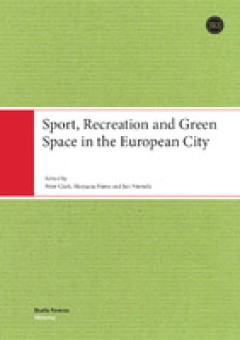Filter by

Sport, recreation and green space in the European city
Green space has become a major issue in European cities in recent years as a result of enhanced environmental awareness, urban marketing, planning policy and growing population densities. Up to now, however, the subject of sports areas and grounds has attracted little research, despite the fact that since the First World War such public and private areas – from football pitches and running tr…
- Edition
- -
- ISBN/ISSN
- 9789522227911
- Collation
- 220 p. : ill., maps ; 25 cm.
- Series Title
- Studia Fennica. 16
- Call Number
- 796 SPO s

jazz republic: music, race, and American culture in Weimar Germany
Jonathan O. Wipplinger.
- Edition
- -
- ISBN/ISSN
- 9780472053407
- Collation
- xi, 311 pages : illustrations ; 24 cm.
- Series Title
- Social history, popular culture, and politics in Germany
- Call Number
- -

Status and dynamics of forests in Germany : results of the National Forest Mo…
Forest ecosystems in Central Europe are changing as a result of anthropogenic influences and changing climate conditions. As such, a large-scale monitoring programme was undertaken in order to understand the influence of site modification, deposition of air pollutants, and climate. This book presents the scientific findings of this study for Germany, including the major challenges with regar…
- Edition
- -
- ISBN/ISSN
- 9783030157340
- Collation
- x, 384p. : ill.
- Series Title
- -
- Call Number
- 634.90943 STA s

Recoding world literature: libraries, print culture, and Germany's pact with …
From the current vantage point of the transformation of books and libraries, B. Venkat Mani presents a historical account of world literature. By locating translation, publication, and circulation along routes of “bibliomigrancy,” Mani narrates how world literature is coded and recoded as literary works find new homes on faraway bookshelves. Mani argues that the proliferation of world liter…
- Edition
- First edition.
- ISBN/ISSN
- 9780823273409 (hardcover)
- Collation
- 348 pages : illustrations, maps ; 23 cm
- Series Title
- -
- Call Number
- 809.3 MAN r

Politics of security: British and West German protest movements and the early…
The Politics of Security tells the story of how people experienced the cold war as a war. It is about the impact of the cold war on political cultures. This crucial issue is often forgotten in historical memory. In particular, the book follows British and West German anti-nuclear-weapons activists in their attempts to campaign for and create security after the destruction of the Second World Wa…
- Edition
- First edition.
- ISBN/ISSN
- 9780199681228
- Collation
- xiv, 342 pages : illustrations (black and white) ; 23 cm.
- Series Title
- Oxford historical monographs
- Call Number
- 322.4094109045 NEH p

Urban memory and visual culture in Berlin: framing the asynchronous city, 195…
As sites of turbulence and transformation, cities are machines for forgetting. And yet archiving and exhibiting the presence of the past remains a key cultural, political and economic activity in many urban environments. This book takes the example of Berlin over the past four decades to chart how the memory culture of the city has responded to the challenges and transformations thrown up by th…
- Edition
- -
- ISBN/ISSN
- 9789089648532
- Collation
- 212 pages : illustrations; 24 cm.
- Series Title
- Cities and cultures
- Call Number
- 153 WAR u

Researching new religious movements : responses and redefinitions
New religious movements such as the Moonies, Jehovah's Witnesses and Hare Krishnas are now well established in mainstream cultural consciousness. But responses to these 'cult' groups still tend to be overwhelmingly negative, characterized by the furious reactions that they evoke from majority interests. Modern societies need to learn how best to respond to such movements, and how to interpret t…
- Edition
- -
- ISBN/ISSN
- 9780203642375
- Collation
- viii, 389p. : ill.
- Series Title
- -
- Call Number
- 200.7041 ARW r
 Computer Science, Information & General Works
Computer Science, Information & General Works  Philosophy & Psychology
Philosophy & Psychology  Religion
Religion  Social Sciences
Social Sciences  Language
Language  Pure Science
Pure Science  Applied Sciences
Applied Sciences  Art & Recreation
Art & Recreation  Literature
Literature  History & Geography
History & Geography